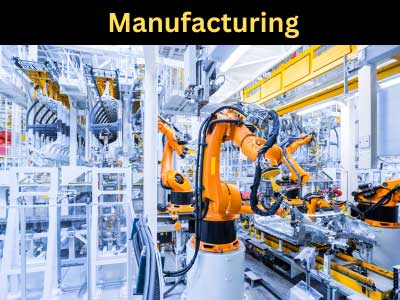What Is Efficient Manufacturing?
Key Takeaway
Efficient manufacturing is the ability to produce goods with the least amount of time, materials, and labor. It focuses on optimizing production processes to maximize output while minimizing waste and costs. This involves using advanced technologies, streamlining workflows, and implementing best practices to enhance productivity.
Benefits of efficient manufacturing include reduced production costs, improved product quality, and increased competitiveness. Key techniques include lean manufacturing, automation, and continuous improvement strategies. By adopting these methods, companies can achieve higher efficiency, better resource utilization, and sustainable growth.
Definition and Overview
Efficient manufacturing refers to the systematic approach of optimizing production processes to achieve the highest output with the least input. This includes reducing waste, minimizing downtime, and improving workflow to enhance productivity and cost-effectiveness. Efficiency in manufacturing is achieved through the integration of advanced technologies, strategic process management, and continuous improvement practices.
Imagine a factory where every step of the production process is streamlined. Machines operate at peak performance, raw materials are used optimally, and products are manufactured with minimal waste. This level of efficiency is the goal of efficient manufacturing, ensuring that resources are used effectively and production runs smoothly without unnecessary interruptions or excess consumption.

Benefits of Efficiency
The benefits of efficient manufacturing are far-reaching, impacting both the financial performance and sustainability of a company.
Cost Reduction
One of the most significant benefits is cost reduction. Efficient manufacturing lowers production costs by reducing waste, optimizing resource use, and minimizing energy consumption. These savings can be substantial and can improve a company’s bottom line.
Increased Productivity
Efficiency leads to increased productivity. By streamlining processes and eliminating bottlenecks, manufacturers can produce more in less time. This not only meets higher demand but also allows for better use of labor and machinery.
Quality Improvement
Efficient manufacturing enhances product quality by standardizing processes and reducing variability. Consistent quality leads to higher customer satisfaction and reduces the costs associated with rework and returns.
Environmental Sustainability
Reducing waste and optimizing resource use contribute to environmental sustainability. Efficient manufacturing practices lower emissions, conserve energy, and minimize the environmental impact of production processes.
Competitive Advantage
Companies that adopt efficient manufacturing practices gain a competitive advantage. Lower costs, higher productivity, and better quality enable them to offer more attractive products and prices, capturing a larger market share.
Key Techniques and Technologies
Several key techniques and technologies are instrumental in achieving efficient manufacturing.
Lean Manufacturing
Lean manufacturing focuses on minimizing waste and maximizing value. Techniques such as Just-in-Time (JIT) production, 5S (Sort, Set in order, Shine, Standardize, Sustain), and Kaizen (continuous improvement) are integral to lean manufacturing.
Automation and Robotics
Automation and robotics enhance efficiency by performing repetitive tasks with precision and speed. Automated systems reduce the likelihood of errors and allow human workers to focus on more complex tasks.
Internet of Things (IoT)
IoT enables real-time monitoring and control of manufacturing processes. Connected devices collect and share data, providing insights into equipment performance, energy use, and process efficiency. This data-driven approach facilitates proactive maintenance and process optimization.
Advanced Analytics
Advanced analytics tools analyze large datasets to identify patterns and areas for improvement. Predictive analytics can forecast equipment failures, optimize supply chains, and enhance production planning.
Energy Management Systems (EMS)
EMS monitor and manage energy use in manufacturing facilities. By optimizing energy consumption, EMS reduce costs and improve sustainability.
Case Studies and Examples
Real-world examples demonstrate the impact of efficient manufacturing practices.
Toyota
Toyota is renowned for its efficient manufacturing practices, particularly its implementation of lean manufacturing principles. The Toyota Production System (TPS) emphasizes waste reduction, continuous improvement, and respect for people. These practices have enabled Toyota to achieve high levels of efficiency and quality.
General Electric (GE)
GE has integrated advanced analytics and IoT into its manufacturing processes. By using real-time data to monitor equipment health and performance, GE has reduced downtime, optimized maintenance schedules, and improved overall efficiency.
Siemens
Siemens uses automation and robotics extensively in its manufacturing operations. These technologies have enhanced productivity, reduced errors, and allowed for flexible production processes, adapting quickly to changing market demands.
Coca-Cola
Coca-Cola’s bottling plants employ energy management systems to optimize energy use and reduce costs. These systems monitor energy consumption in real-time, enabling Coca-Cola to implement energy-saving measures and improve sustainability.
Implementation Strategies
Implementing efficient manufacturing practices requires a structured approach and strategic planning.
Conducting an Efficiency Audit
An efficiency audit assesses current manufacturing processes to identify areas for improvement. This involves evaluating energy use, material waste, production flow, and equipment performance.
Employee Training and Engagement
Training employees on efficient manufacturing practices is crucial. Workers should understand the principles of lean manufacturing, energy management, and the use of new technologies. Engaging employees in continuous improvement initiatives fosters a culture of efficiency.
Investing in Technology
Investing in automation, IoT, advanced analytics, and energy management systems is essential for achieving efficiency. While these technologies may require upfront investment, the long-term benefits in terms of cost savings and productivity gains are substantial.
Process Optimization
Optimizing manufacturing processes involves implementing lean principles, reducing bottlenecks, and ensuring smooth workflow. Regularly reviewing and refining processes ensures continuous improvement and adaptation to changing conditions.
Monitoring and Continuous Improvement
Continuous monitoring of production processes and energy use is vital for maintaining efficiency. Using real-time data to track performance and identify issues enables prompt corrective actions. Implementing a continuous improvement program, such as Kaizen, ensures ongoing enhancements.
Conclusion
In conclusion, efficient manufacturing is critical for the success and sustainability of modern industrial operations. By optimizing processes, integrating advanced technologies, and adopting best practices, manufacturers can achieve significant benefits, including cost reduction, increased productivity, improved quality, environmental sustainability, and competitive advantage.
For newly joined engineers, understanding efficient manufacturing is essential for contributing to the success of their organizations. By mastering key techniques such as lean manufacturing, automation, IoT, and advanced analytics, engineers can drive innovation and operational excellence.
